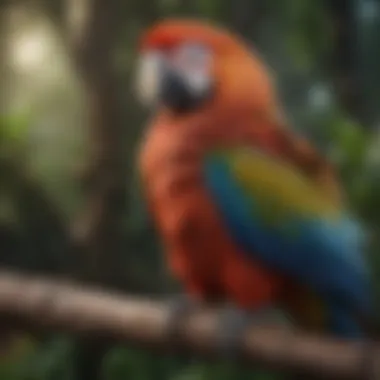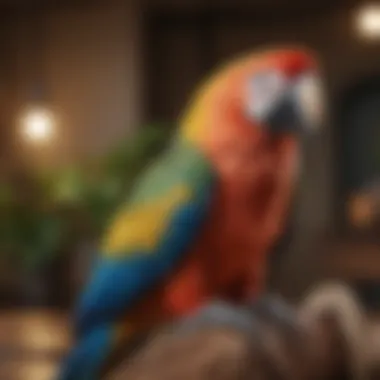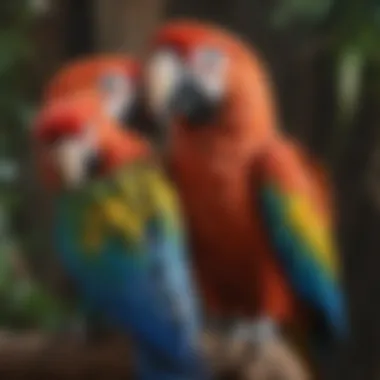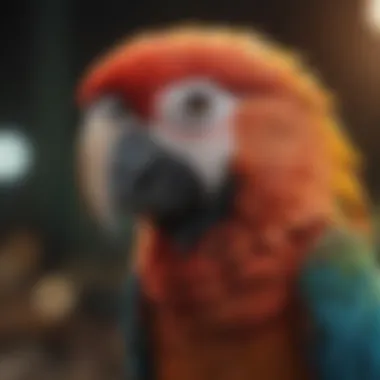Understanding Macaw Lifespan: Insights for Better Care


Intro
Understanding the lifespan of macaws offers important insights for care and better management in captivity. Macaws are more than just beautiful pets; they are intelligent beings that require thoughtful attention to their needs. Proper care, diet, and environment significantly influence their longevity.
The lifespan of these birds can vary widely based on a multitude of factors. This article aims to dissect these different elements, improving both knowledge and practices among pet owners. By recognizing the various aspects that contribute to a macaw's life span, owners can create a suitable habitat, potentially extending their pet's life significantly.
Grooming Techniques
Grooming plays a pivotal role in the health and well-being of macaws. It is essential not just for cleanliness but also for bonding and preventing health issues. Below are some key aspects of grooming for macaws.
Basic Grooming Tools
- Bird-safe shampoo: Essential for bathing.
- Nail clippers: To prevent overgrowth.
- Soft brushes: Useful for feather care.
- Cotton swabs: Helpful for cleaning sensitive areas.
Step-by-Step Grooming Guides
- Bathing: Start by using lukewarm water. Sprinkle water over the macaw or provide a shallow dish for them to bathe in.
- Feather Inspection: Check for any abnormalities or feather damage. This can help catch any health issues early.
- Nail Trimming: Gently hold the foot and clip just the tip of the nail. Avoid the quick, which can cause bleeding.
- Cleaning the Vent Area: Use a cotton swab dipped in warm water to help maintain cleanliness in sensitive areas.
Breed-Specific Grooming Needs
Different macaw breeds might have unique grooming requirements. For instance, the hyacinth macaw has a different feather texture compared to the scarlet macaw, requiring specific types of care. Being aware of these differences ensures a more tailored grooming experience.
Health and Wellness
A macaw's health directly affects its lifespan. This section highlights efficient ways to maintain optimal health and wellness.
Nutrition and Diet Tips
A balanced diet is crucial. Macaws need a mix of seeds, nuts, fruits, and vegetables. Consider incorporating foods like:
- Leafy greens: Spinach, kale, or romaine.
- Fresh fruits: Apples, bananas, and berries.
- Nuts: Walnuts, almonds, and pecans.
Common Health Issues and Solutions
Common health problems in macaws include:
- Obesity: A high-calorie diet can lead to obesity. Ensure moderation in treats.
- Feather plucking: This often indicates stress or illness. Regular vet check-ups and environmental enrichment help.
Importance of Regular Check-Ups
Regular veterinary visits are essential for macaws. Routine examinations can catch potential health issues early. These may include weight checks, blood tests, and physical health assessments. Keeping an ongoing relationship with an avian veterinarian is wise.
“A stitch in time saves nine.” The same principle applies to regular health assessments for your macaw.
Training and Behavior
Understanding macaw behavior is vital for ensuring a harmonious household. The following pointers can help ease any training concerns.
Basic Training Commands
Teaching basic commands creates predictability for both the bird and the owner. Here are commands to start with:
- Step Up: Encourages the macaw to perch on your hand.
- Come: Teaches them to return to you when called.
Understanding Common Behavioral Issues


Behavioral problems can arise from stress, boredom, or inadequate care. Identifying these triggers early helps in correcting them. Examples include:
- Excessive screeching: This could indicate boredom or loneliness.
- Aggression: Understanding body language is crucial for prevention.
Techniques for Effective Training
Patience and positive reinforcement are key. Use treats to reward good behavior and keep training sessions short but frequent. This will help maintain engagement and interest.
Community Insights
The community plays a significant role in understanding care practices. Sharing experiences enriches the knowledge base for all macaw owners.
User-Submitted Tips and Tricks
Many owners have valuable insights based on personal experiences. Engaging in forums or community groups can provide fresh ideas and solutions.
Real-Life Grooming Experiences
Learning from others’ successes and mistakes informs better practices. This communal approach can be beneficial.
Expert Guest Contributions
Inviting experts to share strategies fosters a collaborative approach to macaw care. Webinars, workshops, and articles can help owners stay informed about recent developments in avian care.
In summary, understanding macaw lifespan involves addressing grooming, health, training, and community insights. Being aware of these elements aids in ensuring longevity and overall well-being for pet macaws. This knowledge, when applied effectively, helps enrich the lives of these remarkable birds.
Preface to Macaw Lifespan
Understanding the lifespan of macaws is critical for both current and prospective owners. This knowledge aids in the provision of suitable environments for their survival and happiness. Knowing the average lifespan and factors influencing it can lead to improved care strategies, ultimately enhancing the quality of life for these birds. This section delves into what macaw lifespan entails, outlining the essential elements that inform better caring practices.
Overview of Macaws
Macaws are vibrant, intelligent parrots known for their striking colors and engaging personalities. These birds typically inhabit dense rainforests but can also be found in dried forests and savannas. There are several species of macaws, each with unique characteristics. They display remarkable social behavior and require frequent interaction to thrive. Most noteworthy, macaws are long-lived compared to other bird species, making their care a long-term commitment. Their social nature means they thrive in environments where they feel secure and stimulated.
Importance of Understanding Lifespan
Grasping the intricacies of a macaw's lifespan is crucial for ensuring their overall well-being. Their longevity can be as much as 50 years or more in captivity. Therefore, pet owners must consider various factors affecting health and life expectancy.
- Nutrition and Diet: A balanced diet contributes significantly to macaw health, while lack of it can lead to severe health issues.
- Environment Quality: An enriching environment impacts their physical and mental health, directly influencing lifespan.
- Social Needs: macaws require companionship, either from humans or other birds, to remain emotionally fulfilled. Healthy relationships enhance their longevity.
Understanding these concepts enables owners to implement better care practices. This connection serves to create a more enriching life for macaws, allowing them to express their natural behaviors and live longer, fulfilling lives.
Average Lifespan of Macaws
Understanding the average lifespan of macaws is fundamental for both potential and current owners. This knowledge not only ensures that they can plan adequately for the future but also allows them to provide optimal care throughout the macaw’s life. A clear grasp of longevity brings clarity to expectations and emphasizes the commitment required when keeping such intelligent and social birds.
General Lifespan Range
The lifespan of macaws can vary widely, generally ranging from 30 to 50 years in captivity. Such longevity surpasses many common pets, which amplifies the responsibility that comes with ownership. Factors influencing this range include species traits, individual genetics, and environmental factors. A thorough understanding of these elements helps owners prepare for a long-term companionship and fosters a deeper relationship with their feathered friends.
Most individuals assume larger species, like the hyacinth macaw, may live longer than smaller breeds, but that is not always the case. Matter of fact, smaller species like the blue-headed parrot can sometimes reach impressive ages as well. A reliable rule of thumb for macaw owners is to anticipate around 40 years for a well-cared-for bird, although some have been known to live even longer when provided with exceptional care and a suitable environment.
Variances Among Different Species
Each macaw species carries unique characteristics, which also influence their lifespan. For example, the ara macaws, known for their vibrant colors and intelligence, can differ significantly in life expectancy. The blue and gold macaw often enjoys a lifespan of around 30 to 50 years, while the scarlet macaw has a similar range.
Conversely, some of the smaller species might not reach the higher end of this average due to various factors like breeding and care. The severe macaw is generally less known, and while it can live up to 30 years, the circumstances of their care can dramatically shift this expectation.


Factors Affecting Macaw Lifespan
Understanding the factors that influence the lifespan of macaws is crucial for anyone involved with these birds. Various elements play a role in determining how long a macaw may live, including genetics, diet, environmental conditions, and social needs. Each of these aspects contributes to the overall health and longevity of these intelligent creatures.
Genetics and Breed Differences
Genetics plays a significant role in the lifespan of macaws. Different species exhibit variances in longevity stemming from their unique genetic makeup. For instance, larger macaw species like the Hyacinth Macaw often have different health concerns compared to smaller species like the Blue-fronted Amazon.
It is important for potential macaw owners to research breed-specific traits. Some genetic predispositions may lead to certain health issues, which can shorten a bird’s lifespan. Choosing a macaw from a reputable breeder can mitigate risks associated with genetic lineage.
Dietary Needs and Nutrition
Proper nutrition is one of the pillars of macaw health and longevity. A balanced diet rich in fruits, vegetables, nuts, and seeds promotes optimal development and helps bolster the immune system. Each macaw species has specific dietary needs, and understanding these is essential for preventive health care.
Deficiencies in essential vitamins and minerals can contribute to various health problems, such as obesity and liver disease, both of which negatively impact lifespan. Owners should consult with avian veterinarians to establish a proper nutritional plan tailored to their macaw's needs to support longer, healthier lives.
Environmental Conditions
The environment in which a macaw lives significantly affects its lifespan. Factors such as space, cleanliness, and safety can all play a role in how well a macaw thrives. A spacious cage allows for movement and exercise, which is necessary to keep the bird physically healthy.
Moreover, exposure to harmful substances, whether through poor air quality or inadequate sanitation, can lead to chronic health issues. Ensuring a clean living space and regular maintenance is vital. Furthermore, providing an appropriate temperature and humidity level aligns with the macaw's natural habitat, further supporting its well-being.
Social Interaction and Mental Stimulation
Macaws are highly social animals. They require regular interaction with both humans and fellow birds. Lack of social stimulation can lead to behavioral issues, such as boredom and anxiety, which could shorten their lifespan.
Engaging a macaw in interactive play and providing companionship can significantly enhance its quality of life. Mental stimulation can be achieved through various toys, puzzles, and training activities. A mentally stimulated macaw is more likely to be happy and healthy, ultimately leading to a longer life.
In summary, understanding these factors is essential for anyone who wants to enhance the lifespan of their macaw. Proper care starts with knowledge and commitment to ensuring these magnificent birds receive everything they need to thrive.
Common Health Concerns in Macaws
Understanding common health concerns in macaws is crucial for ensuring their well-being and longevity. Macaws, being intelligent and social creatures, need more than just a healthy diet. Their health issues can significantly impact their quality of life and overall lifespan. Awareness of these concerns allows owners to take proactive measures, promoting better care and a more fulfilling life for their feathered companions.
Impact of Diseases on Longevity
Diseases can greatly affect the longevity of macaws. Birds, especially macaws, are susceptible to various health issues which can arise from their environment, diet, and genetics. Common diseases include psittacosis, obesity, and feather plucking.
- Psittacosis: This bacterial infection can lead to respiratory problems, and if untreated, it may become serious. Prompt identification and treatment are essential.
- Obesity: Many macaws struggle with obesity due to improper diet or lack of activity. Excess weight can lead to serious health issues such as heart disease and fatty liver syndrome.
- Feather Plucking: This behavioral problem can arise from stress or boredom and may lead to skin infections or psychological distress.
Addressing these health threats is vital, as their effects can shorten a macaw's life. Awareness of symptoms and early treatment can lead to more positive outcomes and better health management.
Importance of Regular Veterinary Care
Regular veterinary care plays an indispensable role in the health management of macaws. Just like any other pet, routine check-ups can help in early detection of potential health issues. These visits enable veterinarians to:
- Monitor General Health: Regular examinations allow for a comprehensive assessment of a macaw's health status.
- Prevent Diseases: Vaccinations and preventive measures can protect birds from more severe health complications.
- Provide Nutritional Guidance: Veterinarians can offer valuable insights on appropriate diet formulations tailored to the specific needs of macaws.
- Educational Support: Routine care helps educate owners about the signs of distress or illness, and what measures should be taken.
By prioritizing veterinary care, macaw owners can gather the tools necessary to maintain a healthy and thriving environment, thus enhancing their pet’s overall lifespan and quality of life.
Enhancing Macaw Lifespan
Understanding how to enhance the lifespan of macaws is crucial for any owner or enthusiast wishing to ensure the health and longevity of these magnificent birds. Many factors influence how long a macaw can live, and by addressing these, one can significantly improve their quality of life. Key aspects such as diet, environmental stimulation, and mental enrichment play vital roles. An optimized living situation allows for a fulfillment of their natural behaviors, directly tying into their overall well-being and longevity.
Best Practices for Diet and Nutrition


Diet is one of the most critical factors influencing a macaw's lifespan. A proper diet should include a mix of fresh fruits, vegetables, high-quality pellets, and nuts. For example:
- Fruits like bananas, apples, and papayas supply essential vitamins.
- Vegetables such as carrots and leafy greens enhance nutrient intake.
- Pellets provide a balanced diet specifically formulated for macaws.
- Nuts, while high in fat, offer protein and should be given in moderation.
Regularly evaluating and adjusting their diet based on age and activity can make a substantial difference. It is essential to avoid foods high in sugar or salt, as these can lead to health issues. Additionally, providing fresh water daily ensures hydration, playing a pivotal role in maintaining their health.
Creating a Stimulating Environment
Creating a stimulating environment is essential. Macaws are intelligent creatures that thrive on interaction and experiences that challenge their minds. Here are several considerations:
- Space: Ensure the cage is spacious enough for them to fly and move.
- Perches: Use different sized perches to promote foot health and provide variety.
- Toys: Provide a variety of toys that encourage chewing and problem-solving. Rotate toys regularly to maintain interest.
A well-designed environment also includes safe exploration areas outside the cage, ensuring both physical and intellectual stimulation. An enriched habitat can lead to lower stress levels, promoting a longer lifespan.
The Role of Enrichment and Play
Play and enrichment activities are fundamental for macaws. Engaging these birds in new and exciting activities is a pathway to mental health. Here are ways to implement this:
- Interactive toys: Toys that require manipulation can keep their minds active.
- Training sessions: Teach them new tricks or commands; this not only stimulates them but strengthens the bond between owner and bird.
- Social interaction: Encourage time outside the cage and interacting with people or other pets to fulfill their social needs.
Additionally, incorporating household activities or safe outings can also contribute to their mental well-being. Enrichment strategies not only mitigate behavioral issues but also promote excitement and agility, impacting overall lifespan positively.
By addressing diet, environment, and play in macaw care, owners take significant steps towards maximizing their pets' health and longevity. Every bird deserves a nurturing and stimulating home to thrive.
Lifespan Comparisons in Avian Species
Understanding the lifespan of macaws necessitates a broader perspective that includes comparisons with other avian species. This section emphasizes the significance of these comparisons, highlighting factors that can influence lifespan, including genetic predisposition, environmental adaptability, and social structures. Knowing these aspects can greatly inform macaw owners and enthusiasts in their caregiving practices and improve the overall health of these magnificent creatures.
Macaws vs.
Other Parrots
When comparing macaws with other parrot species, we observe that macaws often have a longer lifespan. For example, the average lifespan of a Blue and Gold Macaw can reach up to 50 years in captivity, whereas other parrots, like budgerigars, may live only about 5 to 10 years. The slightly larger size and the complex social needs of macaws typically demand more attention in their care, leading to different lifespans derived from those differences as well.
Moreover, macaws are distinguished by their impressive cognitive abilities and social structures. These attributes provide broad avenues for interaction and enrichment, which positively influence longevity. While some smaller parrot species can thrive in modest conditions, macaws require a more attentive environment that supports their active and intelligent nature.
A well-cared-for macaw can often outlive other parrot species, showcasing the mutual relationship between proper care and lifespan.
Lifespan in Wild vs.
Captivity
A vital consideration in discussing macaw lifespans is the distinction between their longevity in natural habitats versus captivity. In the wild, macaws face numerous threats such as habitat destruction, predation, and scarcity of food, which can significantly shorten their lifespan. Here, they may live around 20 to 30 years due to these external pressures.
Conversely, macaws kept in captivity can experience extended lifespans, often living beyond 50 years, when provided with proper nutrition, veterinary care, and social interaction. The controlled environment allows for consistent access to food, a safe habitat, and regular health check-ups. However, the quality of care provided directly correlates with their longevity. It is also imperative to strike a balance in them getting enough mental stimulation to mimic natural behaviors that ensure their well-being.
Closure
Understanding the lifespan of macaws is critical for owners and enthusiasts alike. This section summarizes the key elements of the article, allowing readers to grasp essential insights about enhancing the longevity and health of these remarkable birds.
Recap of Key Points
In this article, we explored several aspects related to macaw lifespan, including:
- Average Lifespan: Macaws generally live between 30 to 50 years, with some species reaching even higher ages.
- Factors Affecting Lifespan: Genetics, quality of diet, environmental conditions, and social interaction all play a significant role in determining longevity.
- Common Health Concerns: Diseases and health issues can drastically affect the lifespan and well-being of macaws. Regular veterinary checks are crucial.
- Enhancing Lifespan: Providing a nutrient-dense diet, a stimulating environment, and opportunities for social engagement are vital for macaw care.
- Lifespan Comparisons: Differences in lifespan exist between macaws and other parrots, and conditions in captivity can influence longevity compared to wild populations.
Implications for Macaw Owners
For macaw owners, the implications of understanding these factors are far-reaching. By simply being aware of what influences macaw lifespan, owners can make informed decisions that directly impact their birds' health and well-being. Here are some considerations:
- Diet: Owners need to prioritize a balanced diet that includes a variety of fruits, vegetables, nuts, and specialized pellets.
- Environmental Enrichment: Regular opportunities for play and exploration can reduce stress and foster better mental health in macaws.
- Social Needs: Since macaws are inherently social creatures, spending quality time with them and providing companionship is essential.
- Veterinary Care: Establishing a relationship with an avian vet can provide guidance in maintaining optimal health for macaws, also aiding in early disease detection.
By applying these insights, macaw owners can create a nurturing environment that not only prolongs their birds’ lives but also enhances their quality of life.







